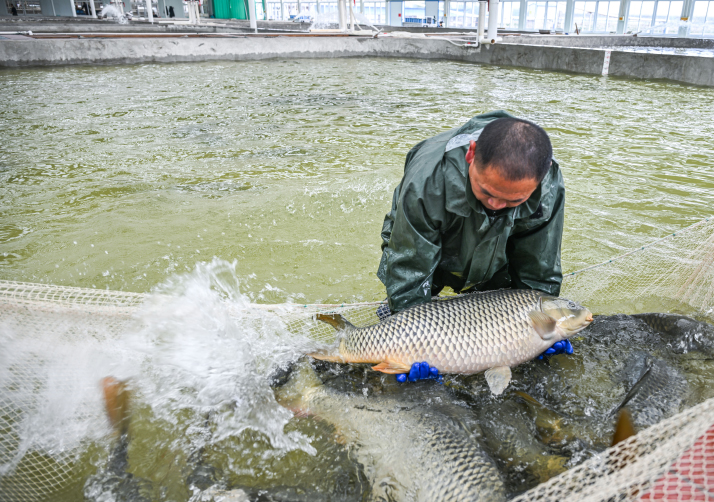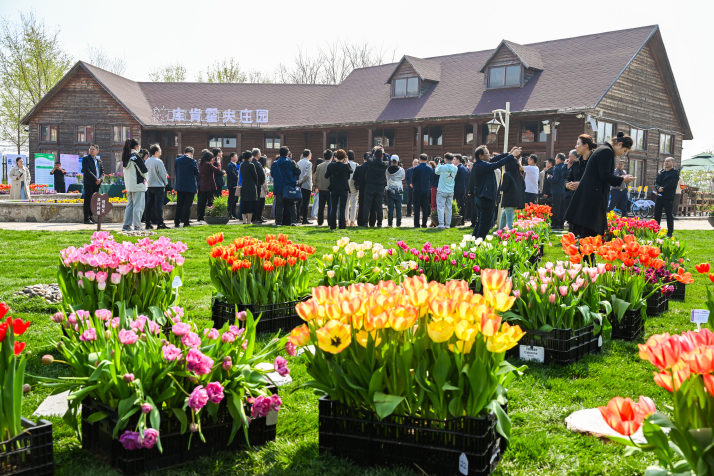| China |
| Seeds for success | |
|
|
 A worker moves carp that are about to enter the spawning period into the spawning tanks at the Huanxin Aquatic Breeding Farm in Ninghe District, Tianjin, on April 10 A tulip festival officially opens at Keukenhof Manor in Yuelong Town, Ninghe, on April 10. Over 100 varieties of tulips bloomed across the garden (WEI YAO)
On April 10, a tulip festival officially opened at Keukenhof Manor in Yuelong Town of Ninghe District in northeast Tianjin Municipality. Under the bright spring sky, over 100 varieties of tulips, displayed in garden beds, pots and as fresh-cut flowers, captivated visitors with their beauty. The industry behind the tulip Keukenhof Manor is both a tourist attraction and Tianjin's only national-level nursery facility specifically designed for the testing and introduction of imported plant varieties. Most of the tulip varieties grown here are imported from the Netherlands. A sign reading "Quarantine Testing Nursery" hangs at the entrance, indicating that this facility is where all imported plant materials are sampled and tested for pests and diseases before they are allowed into the country. During the festival's opening ceremony, Shi Yingxue, General Manager of Amster (Tianjin) Agricultural Technology Co. Ltd., which manages the tulip plantation at the manor, guided attendees through the floral displays while discussing the nursery's role. The nursery tests over 300 varieties of bulbous flowers, including not only tulips but also amaryllis, hyacinths and daffodils. Additionally, it has imported over 100 varieties of quality grass seeds and more than 10 types of medicinal herbs to create a diverse plant genetic resource bank. In 2023, Keukenhof Manor successfully obtained customs quarantine nursery status, established strategic partnerships with several logistics companies, and signed a technical support agreement with customs laboratories. This ensures a comprehensive supply chain for plant materials entering Tianjin. As living standards rise and aesthetic demands evolve, tulips, lilies and hyacinths have become essential for urban greening, home gardening and festive celebrations in China. The increasing number of spring tulip festivals across cities has driven up demand for tulip bulbs, making China one of the largest import markets for Dutch bulbs. With climate conditions in Ninghe closely resembling those of Dutch flower regions and with Tianjin's logistical advantages in north China, the area is well-positioned for growth in the flower import industry. Shi plans to expand sales channels beyond business-to-business to include direct-to-consumer options, allowing more people to purchase the finest Dutch tulip varieties.  A tulip festival officially opens at Keukenhof Manor in Yuelong Town, Ninghe District in Tianjin, on April 10. Over a hundred varieties of tulips bloomed across the garden (WEI YAO)
Nurturing quality seeds Yuelong is an agricultural hub. Beyond the colorful tulip gardens, the fields are bustling with spring activities such as land preparation, mulching and planting, primarily focusing on sweet potatoes. Signs proclaiming the town to be the "Hometown of Hongyao" dot the landscape, referring to a premium variety of sweet potato known for its sweetness and delicate texture, cultivated in several provinces across China. The soil in Yuelong is rich and friable, with water sourced from valleys in the nearby Yanshan Mountains, making it ideal for growing Hongyao sweet potatoes. After years of experimentation, the red-fleshed sweet potatoes produced here have gained a reputation for exceptional quality. In 2024, the growing area for Hongyao sweet potatoes reached nearly 1,200 hectares, a 200-percent increase from the previous year. "Our Hongyao sweet potatoes yields reach up to 37,500 kg per hectare, with a high degree of sweetness. There's no issue selling them, with current prices at over 4 yuan ($0.54) per kg—three to four times higher than ordinary sweet potatoes," said Zhang Lijun, a sweet potato farmer from Daliangzhuang Village. Since starting with a few hectares in 2019, Zhang expanded his cultivation to some 67 hectares by the end of 2024, reaping ample profits from this highly marketable crop. As cultivation expands, Yuelong is also enhancing its entire industry chain, innovating sales channels and deepening its brand presence. They have established a breeding center with nearly 100 greenhouses for sweet potato propagation. Wang Tiecheng from Tianjin Huigu Yuelong Red Agricultural Technology Development Co. Ltd. explained that the company introduced over 200,000 kg of high-quality seed sweet potatoes in 2024, producing 25 million virus-free seedlings to help ensure the quality of Hongyao sweet potatoes from the start. With a steady supply of quality seed sweet potatoes, Yuelong has built large-scale smart storage facilities and processing centers for sweet potatoes, providing year-round supply to the market. Yuelong has also created a distinctive brand system centered on local products, collaborating with major fresh food supermarkets and utilizing livestreaming platforms for marketing, thus enhancing product recognition and competitiveness. The Yuelong Hongyao brand is increasingly well-known, already having reached markets in Southeast Asia. Beijing-Tianjin-Hebei agricultural hub Ninghe is a traditional agricultural stronghold in Tianjin, and in recent years, it has focused on building a strong genetics industry as a core strategy, nurturing leading national agricultural product brands. Covering 1,296 square km, Ninghe is home to 18 genetics enterprises, including four national-level breeding farms for rice, pigs and fish. Tianjin Huanxin Aquatic Breeding Farm is a prime example. With over 60 years of history, this national-level fish breeding facility houses 52 species and over 250,000 live fish across 55 ponds, making it a renowned breeding base for freshwater fish like carp and crucian carp in north China, with an annual production capacity exceeding 4 billion fries. From April to May, workers in its breeding workshop are busy preparing for the most critical fish breeding season in north China. As of early April this year, they had already received orders for 400 million German Mirror Carp fries, with overall orders increasing by 30 percent compared to last year. In the breeding workshop, workers move mature carp, ready to spawn, from outdoor ponds to spawning tanks. These broodstock, aged between five and 10 years, differ remarkably from typical market carp, with some exceeding 40 kg. After spawning, the eggs are quickly transferred to hatching tanks for incubation. During April and May, the facility operates almost around the clock, producing large quantities of crucian carp and common carp fry primarily sold to Jiangsu, Hebei and Liaoning provinces. Many other enterprises similar to Huanxin that rely on quality genetics to establish regional brand advantages have settled in Ninghe. Ninghe is well on its way to becoming a leader in genetic quality and agricultural excellence. BR Copyedited by G.P. Wilson Comments to weiyao@cicgamericas.com |
|
||||||||||||||||||||||||||||||
|